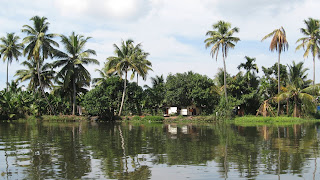It seems only the older folk wear the traditional clothes of sarees for the women and lunghis for the men. Youngsters go for the jeans and t-shirts and long skirts for a modern conservative look. (Lots of t-shirt slogans, such as "Don't walk on the grass - smoke it" or just nonsense in English.) Everyone carries an umbrella - handy for occasional rain and useful as a parasol around midday. In Kandy we also saw them used at night time as people walked under trees full of crows and fruit bats - judging by the excrement on the pavements, rather wise. Sinhalese, like Hungarian, appears to use an inordinate number of syllables and everyone speaks fast - sometimes overhearing a conversation is like listening to horse racing commentary.
Invariably everyone is helpful and friendly to us, and on the coast it is sometimes easy to forget there is a full-scale military battle going on in the north of the country. In Haputale there were many soldiers around, possibly because of a visit by the President to a nearby airbase. On longer bus journeys we have passed through checkpoints where most people have got off the bus to have id checked and bags searched. (We're not sure why not everyone gets off - and the searches seem a bit cursory and futile. We were once searched entering a bus station and again on the bus before leaving, but 200 metres down the road picking up more passengers anyway....)
We've come to the south coast for Christmas to visit one of the quiet beaches just a little beyond the developed coastline closer to Colombo. We find a great little guesthouse in Mirissa run by a friendly couple who obviously think we are underweight judging by the breakfasts they serve. Tellingly, we are their first guests since October - everyone says that this year is bad for business. On the beach there are a few quiet restaurants and hotels and not many people to enjoy the clean sands and big surf that comes crashing in. Gayle is immediately in the water, beyond the big waves, paddling around. The water's as warm as a bathtub. This is our second Christmas away from home and it still feels like funny weather to be having. We meet up with others on their Christmas hols, and celebrate Christmas with beers and fish curries on the beach.
On Boxing Day morning there is a minute's silence in remembrance of the tsunami victims. In the evening candle lanterns are lit on the beach. The following day we visit Galle, which has an old Dutch fort. There are school holidays here and lots of locals on holiday. At the fort gates the armed forces have put on a display of weaponry as part of a recruitment drive - with all the fun of the fair. Inside the fort is quiet, but people promenade along the walls, and young men offer to jump off one of the bastions into the sea below.......for a price, of course. Gayle looks over the wall. "That doesn't look hard." "For three hundred rupees, I'll jump" says a long-haired youth in long shorts that are hanging off his hips. "You're joking - I wouldn't give you that!", she laughs. "Have you come from India?" he asks. "Yes. Why?" "No-one who comes from India gives us any money" he says ruefully.
We've been enjoying the fruit here, especially the bananas. There's lots of varieties including pink ones, but our favourite has been the little fat flavoursome ones that the EU has probably banned in Europe. Perhaps this could be our lazy way of describing the country - a banana republic.

















 On the way back down through the village we leave the jeep track and take an ancient and very steep staircase that winds down through a maze of terraced fields, water courses, fruit trees and kitchen gardens. The stairs must be as old as the village, worn smooth and shiny. The villagers are rewarded with fantastic views.
On the way back down through the village we leave the jeep track and take an ancient and very steep staircase that winds down through a maze of terraced fields, water courses, fruit trees and kitchen gardens. The stairs must be as old as the village, worn smooth and shiny. The villagers are rewarded with fantastic views.



